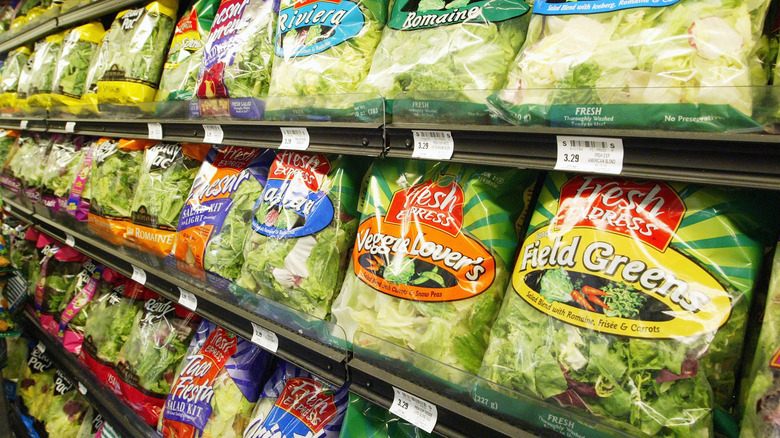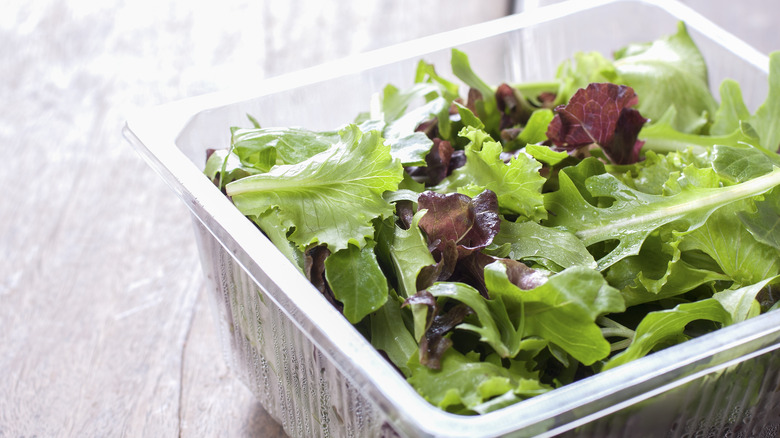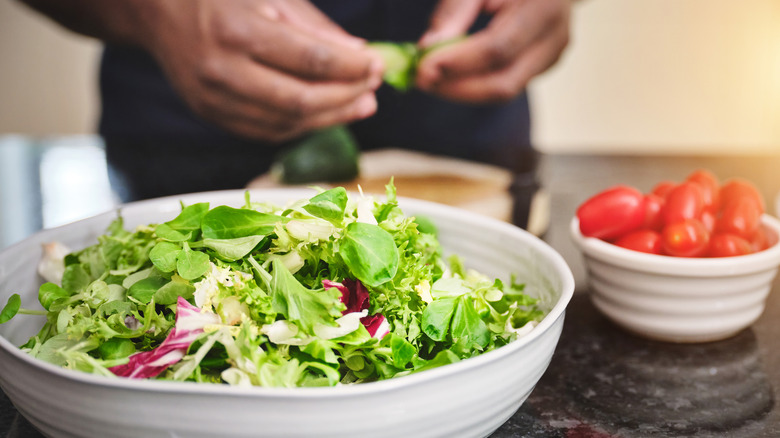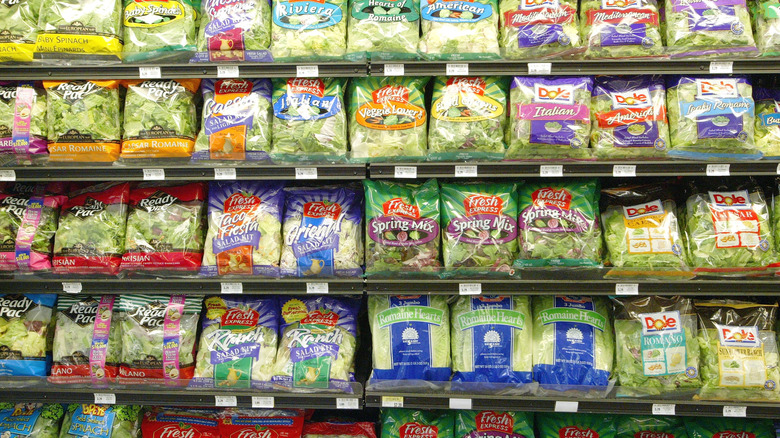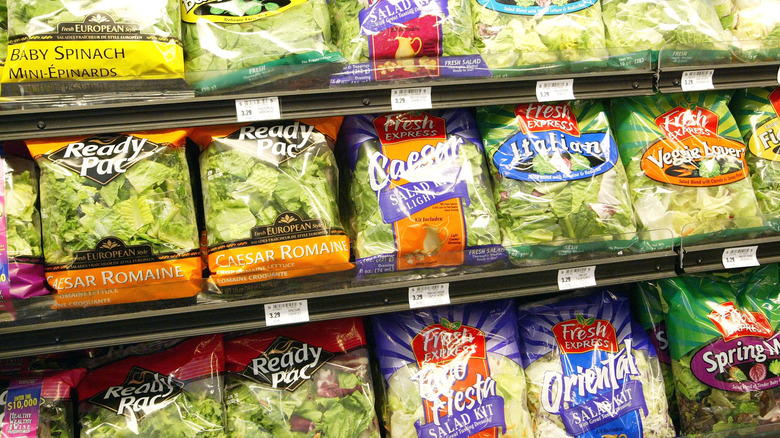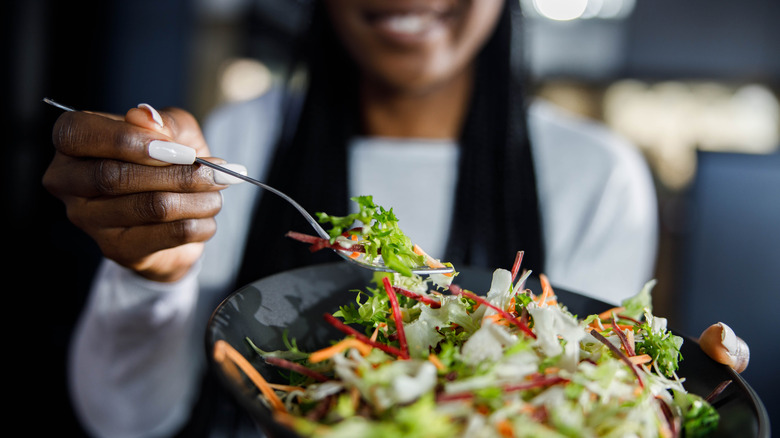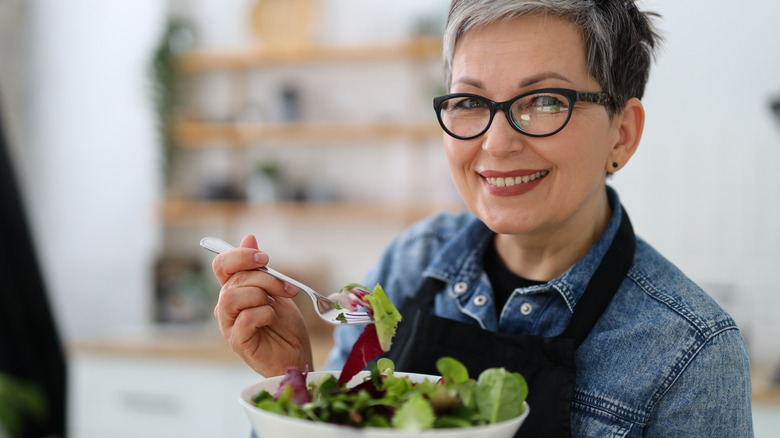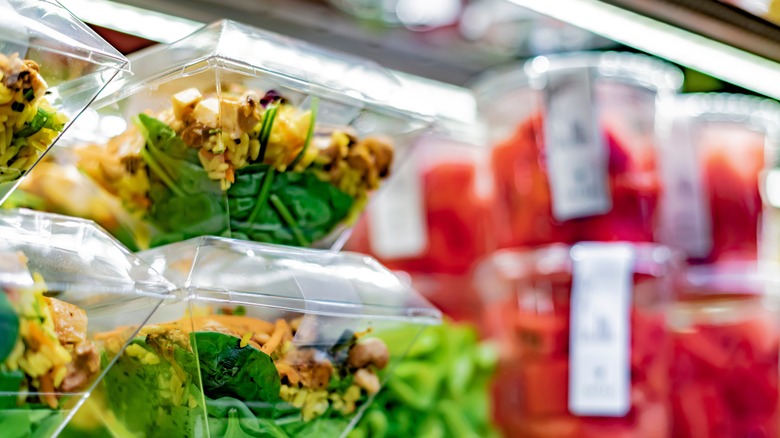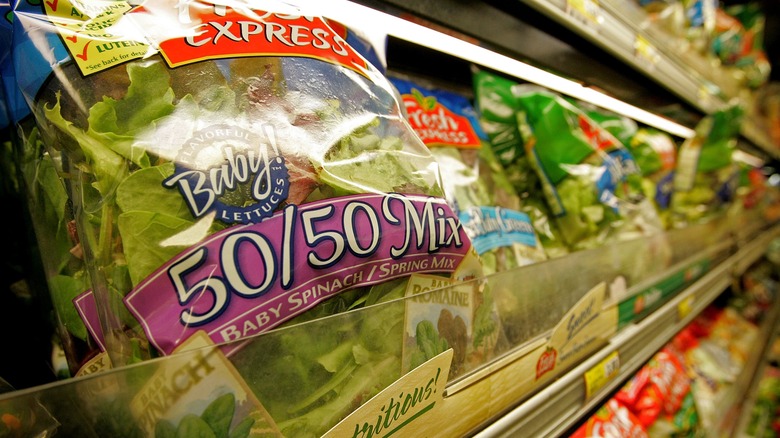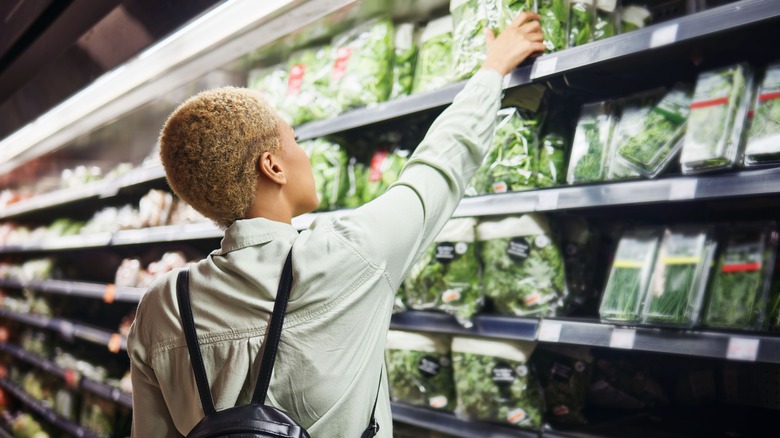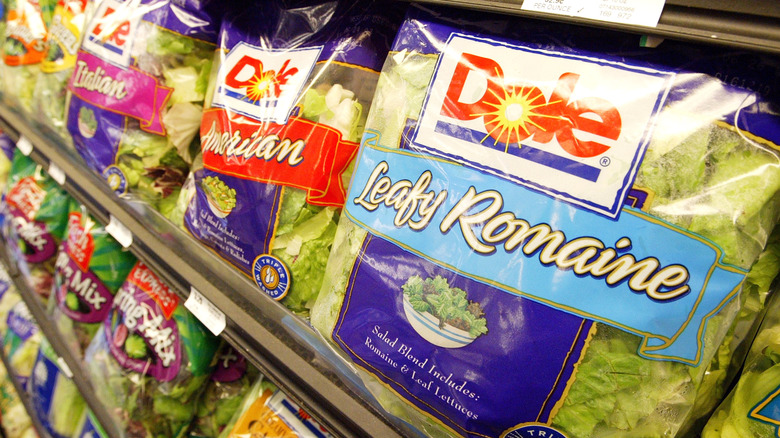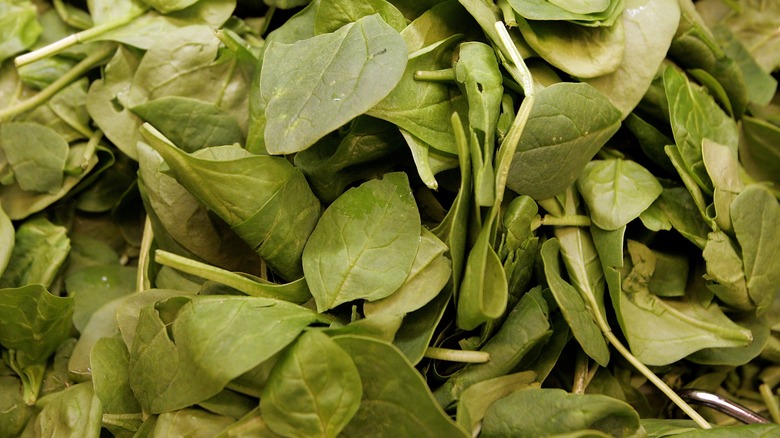A Salad Chef Reveals What To Know Before Buying Another Pre-Packaged Salad
It's no secret that small choices can lead to big changes. For many, that includes swapping out a meal or two with salad. And let's be honest: Salad is pretty great, and it's much more versatile than it might seem at a glance. There are a ton of different options for greens, add-ins, and dressings. In today's busy world, adding salad to a regular meal rotation is easy thanks to the pre-packaged salads that dominate grocery store coolers.
But, all too often, shortcuts are too good to be true. So, what about pre-packaged, bagged salads? Surely, there's not too much that can go wrong here ... is there? We reached out to industry experts to get the inside scoop on what customers should know before throwing a few of these bags into their carts. What we found out just might make bagged salads a new go-to.
We ended up with a surprising number of questions, starting with some serious curiosity on just how cut greens are supposed to stay so fresh for so long, to wondering if we really shouldn't be washing those greens after they come out of the bag. Or should we? Does it depend? And are they all the same? What else do the pros recommend we do with them? We asked the experts — including Christian Friedrich, the Product Research and Development Chef at Fresh Express — all these questions and more.
There is a nutrient difference between pre-packaged and fresh
Pre-packaged salads are easy to love. They're much easier than keeping a fridge full of whole veg on hand, but have you ever wondered if those pre-packaged, pre-chopped greens and veggies lose anything while they're being processed?
The answer is kind of complicated. There's a chance you may have seen fear-mongering headlines claiming that bagged salads lose some valuable vitamins and nutrients when they're processed and packaged to sit on shelves. According to what North Carolina State University Department of Food professor Mario G. Ferruzzi told CNN, delicate greens can be damaged by industrial chopping, but actual nutrient losses are minimal. What about the pre-washing process? That's trickier, as it turns out that exposing the greens to water can cause water-soluble nutrients to leach away.
That may sound scary, but when we reached out to registered dietician and nutritionist Yaa Boayke, CPT, she explained: "While it's true that some nutrient loss can occur during the packaging process, these convenient options still provide a very valuable source of vitamins and minerals." That's especially true for anyone who might be struggling to master chopping skills or to find the time to prep healthy meals. Any nutrient loss is minimal enough that there's no reason to be concerned that you're making a poor choice in reaching for the pre-packaged greens.
Do you need to wash them?
It goes without saying that protecting yourself and your family against food poisoning is a big deal, and headlines linking lettuce and other greens to outbreaks of E. coli, salmonella, and listeria can make it seem like those pre-washed, pre-packaged salads might seem a little too good to be true. If you're washing your bagged salad greens just in case, you're certainly not alone — but do you have to?
We wanted a definitive answer to precisely that, so we reached out to Vanessa Coffman. She's the Alliance Program Director at STOP Foodborne Illness, a national nonprofit dedicated to bringing people up-to-date information on best practices, dangers, and food recall news while advocating for consumer safety. According to Coffman, "Greens that are pre-washed don't need to be washed again if the label says any of the following: Ready-to-eat, triple washed, or no washing necessary. Leafy greens that are not pre-washed should be washed thoroughly before cutting, cooking, or eating."
There you have it! It turns out that those pre-washed salads really are as convenient as they say, as long as it's clearly marked on the package.
Those Fresh Express bags are carefully designed to keep each salad mix fresh
Anyone who's made a salad at home knows that once you cut those lettuce leaves, the clock starts ticking. Leafy salads aren't something you're likely to want to eat as leftovers, so how exactly do pre-packaged salads stay so fresh for so long after they're cut? Is it magic? Pretty close!
We reached out to Christian Friedrich, Product Research and Development Chef at Fresh Express. He shared some fascinating salad science with us, starting with a conversation starter that would have us hooked. "Interestingly, lettuce continues to breathe after it's picked, so we designed a breathable bag for all our bagged salads to help maintain the just-picked flavor," he said. "Our patented Keep-Crisp breathable bag leverages advancements in modified atmosphere technology and utilizes a unique, permeable plastic film that regulates oxygen content within the bag to control the salad's natural 'breathing rate.'"
Pretty wild, right? And here you thought it was just a plastic bag! Instead, it makes that "Guaranteed Fresh" label possible, all thanks to a little bit of everyday magic.
What is the modified atmosphere inside bagged salad packaging?
You've probably opened a pre-packaged salad and not given it a second thought, but inside that bag is a delicately balanced ecosystem that uses what's called a modified atmosphere. In addition to a bag that needs to allow oxygen to flow into it, pre-packaged salads need a specific atmosphere to ensure greens aren't going to wilt and rot, and that there are no unwanted odors and no immediate spoilage. To keep all those unwanted processes from kicking in, the air inside the bag has to prevent anaerobic respiration, a function of the leaves that will lead to spoilage.
The baseline for many pre-packaged salads is a mixture of 5% oxygen (replenished when it's drawn through the permeable bag), 15% carbon dioxide, and 80% nitrogen. But that's just a baseline, and according to Fresh Express, the company goes one step further because different greens require slightly different conditions to stay fresh.
So, not all Keep-Crisp bags are filled with the same gases. Instead, they're curated to the greens inside. Add in Fresh Express' cold-chain processing methods, and it turns out that those cut greens stay fresh thanks to some pretty neat science!
Not all salads are created equal
It's no secret that there's an almost shocking number of options out there when it comes to pre-packaged salads. If you're looking to make the most out of a nutritious meal, how do you know what to look for? We asked registered dietician and nutritionist Yaa Boayke, CPT for her recommendations, and she gave us some great, easy-to-remember guidelines.
Boayke said that in some cases, the add-ons in salads might sabotage any good you're doing by opting for them in the first place. "A variety of add-ons may not be ideal for everyone and can include extra sodium, calories, etc. Some might lack sufficient protein, healthy fats, and/or fiber. It's important to be aware of what's included in your salad kit, and what might need to be added to turn it into a well-rounded meal."
So, what should you be looking for? She stresses that while you should avoid highly processed additions like bacon and croutons, you should also be looking for kits that have things like nuts and seeds. Not only are they healthy, but they'll help keep you feeling full for longer. She also said that there are a few things that are easy to add to a pre-packaged salad to take it to the next level, including convenient toppings like chopped fruits, canned or cooked beans, or lean proteins like chicken, shrimp, or tofu. With these, you can absolutely use those salads as a balanced meal.
They can contain a surprising amount of sodium
When it comes to eating healthy, it's not just what you put on your plate, it's what you're leaving out, too. Scores of studies have looked at the risks associated with added salt and sodium, and surprisingly, pre-packaged salads can be a sneaky source of sodium. It might not seem like salads would be a culprit for adding unwanted sodium to your diet, and that's precisely why we wanted to spotlight it.
Boayke stressed that we should check the sodium content of pre-packaged salads and that we shouldn't just assume they're low in sodium. That said, she confirmed there are plenty of good options out there, and pre-packaged salads that are labeled as low sodium are a safe choice. So, what's going on here? Boayke said that it's the add-ons that can be a little sneaky, like croutons and cheese.
However, that's not to say that you must always avoid adding tasty treats to the top of your salad. Boayke said that it's all about awareness and balance. "Be sure to read what each component contains. Ultimately, you can control how much you add, so think about what you need at that moment, your health status, and goals to determine how much of those additions make sense for you."
A shocking amount of bagged salad is thrown away
Food waste is a massive concern. When we did a deep dive into the most mind-blowing food waste facts we could find, we learned that the world's annual food waste bill totaled around $1 trillion — more than the annual gross domestic product of most countries. In 2017, a British study found that 40% of pre-packaged salads weren't eaten at all (via The Guardian). The problem was that customers tended to grab a few with the best intentions, but without having a solid meal plan.
Tesco produce buyer manager Adam Hill told The Guardian that the supermarket giant was working on resealable packaging that would keep greens fresh for a few days. "We know many shoppers roll up their bagged salads after using them once and stick them at the back of their fridges where they are forgotten," he explained. That's a potentially huge deal, as the greenhouses that produce lettuces also release greenhouse gases on the same scale as pork production facilities.
We asked Friedrich what he thought of those findings. He stressed the fact that when you pick up a bagged salad, they're not just great for salads. Instead, he encouraged us to think of them as an ingredient, not just a meal, and have a plan for using them in place.
Leftover lettuce or other components? Don't throw it away
Pick up a pre-packaged bag of greens, and it might seem like you're in for a "Seinfeld"-style big salad when you open that bag. But there's no reason you can't split those contents up. We asked Friedrich about some of his favorite ways to use salad kit components, and he noted that a bagged salad can go a long way.
"There are lots of ways to use bagged lettuces and salad kits," he said. "Everything from using fresh greens to make smoothies, to appetizers and snacks, to holiday entrees, to adding some flavorful greens to your favorite sandwich. Finding unexpected ways to use leftover lettuce not only reduces waste but can also add an extra nutrition boost. Try incorporating bagged salads into a delicious egg skillet that uses our French Blue Cheese salad kit and basic pantry staples like eggs, heavy cream, and bread," he suggested, adding, "Lettuce can also be great for elevated, easy appetizers like 3-ingredient BLT Caesar salad cups."
We also suggest that some of the seeds and nuts can be used in smoothies or grain bowls, or to dress up your morning yogurt. Sounds pretty delicious, right?
How do you pick the safest, freshest bag?
Expiration dates are tricky things – in some cases, you may not even need to worry about them too much. That's not the case with pre-packaged salads, though, where it's incredibly important to examine the expiration dates on the bags before putting them in your cart. That's according to Boayke, who stressed to us, "Always check the expiration date to ensure you're getting the freshest product, which can affect both taste and nutritional quality."
Coffman also gave us invaluable advice that customers should remember when they're shopping for pre-packaged salads. She said that the dates on the bags are printed not with food safety in mind, but with freshness. So, take an extra minute to check not only the dates but the greens themselves. A single off-looking leaf can indicate that things are going sideways inside the bag.
Coffman stressed that this caution continues when you get home. "If you notice leaves going bad, remove them as their presence will make the whole bag go bad faster," she said. She added that if the bag ended up in a warm environment — in your car or accidentally left behind on the kitchen counter, for example — consider it unsafe to eat after about two hours.
Are prepackaged salads worth the price tag?
Prepared foods like prepackaged salads have a bit of an expensive reputation. It makes sense — grocery stores and restaurants aren't the only places where people pay a little more for convenience. But when we spoke with Friedrich, he explained that quite often, the reality is precisely the opposite.
"Many people avoid salads because they think they have to buy a lot of individual ingredients and do prep work to create the perfect salad — which can be expensive," he said. That's a key point: you're not just comparing the price of a pre-packaged salad to a head of lettuce. Instead, consider all the dressings and add-ons, which can make the equation pretty complicated. Just take the Fresh Express Pear Gorgonzola kit, which contains over a dozen different types of greens, along with glazed almonds, dried pears, and gorgonzola. Try to buy all those ingredients individually and you'll have quite the grocery bill.
Friedrich said that the key is to choose your salad kits carefully. He recommended that you opt for kits that not only have a variety of ingredients but a variety of uses, too. "It makes such a difference when you find a salad kit that you really love and that works for you — it can offer multiple meal opportunities to really get the biggest bang for your buck."
Don't overlook using salad kits in hot meals
One of the things that's a shame about pre-packaged salads is the implication. It's easy to think that you're picking up a bag and making a salad with it, but that's doing this versatile food a massive injustice. Friedrich explained that Fresh Express packaged salad varieties weren't just about salads. Instead, they can offer diners an easy, almost endlessly flexible way to add vegetables and other nutritional goodness to meals.
Sure, you can definitely go the salad route. Fresh Express' lighter salads — which often blend butter lettuce, arugula, and spinach — are a perfect summertime meal that won't leave you feeling uncomfortably full. But Friedrich also stresses that salad kits also have an invaluable place in hot meal prep.
"This is such a versatile salad blend because ... it can be sauteed into the perfect side dish with a little lemon juice and olive oil, rolled into pasta dough and made into your favorite noodle shape, or served as a garnish for a beautifully seared piece of fish," he noted. Get the most out of your pre-packaged salads by reminding yourself that they're not just for salad these days!
